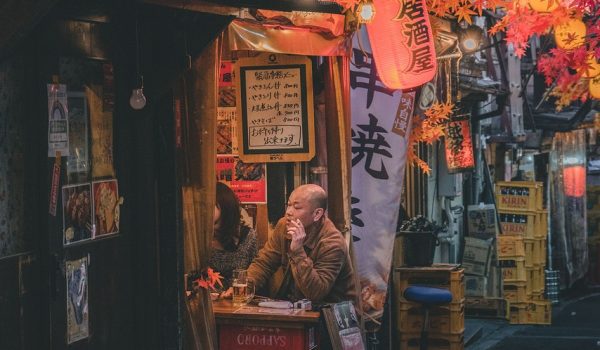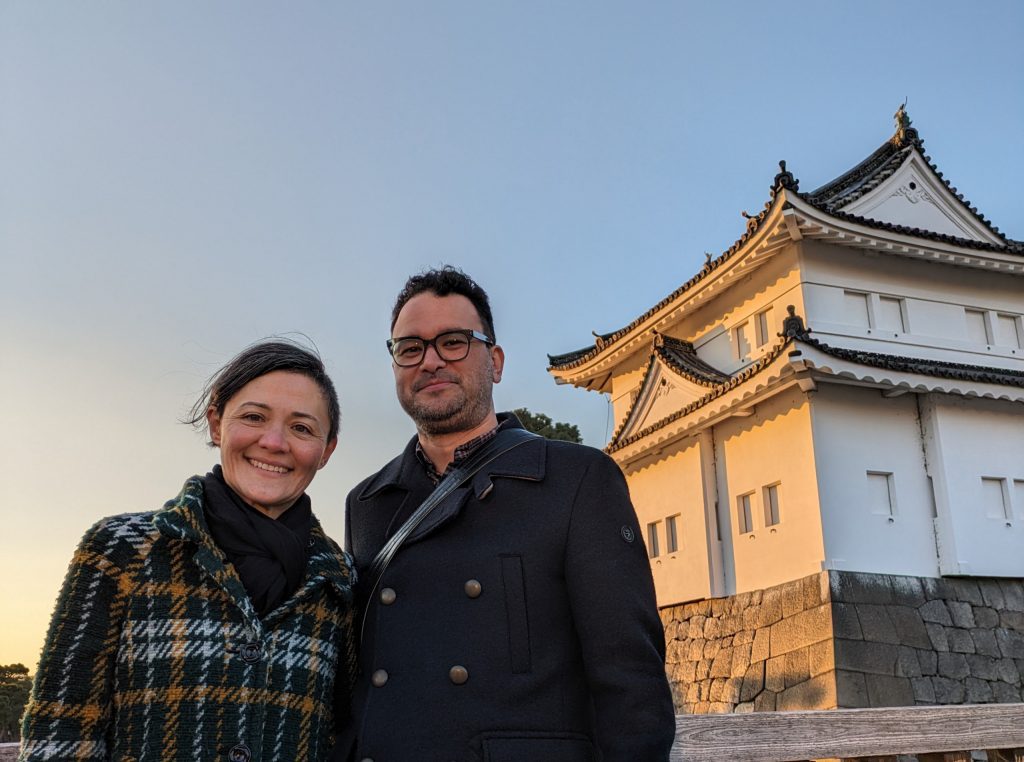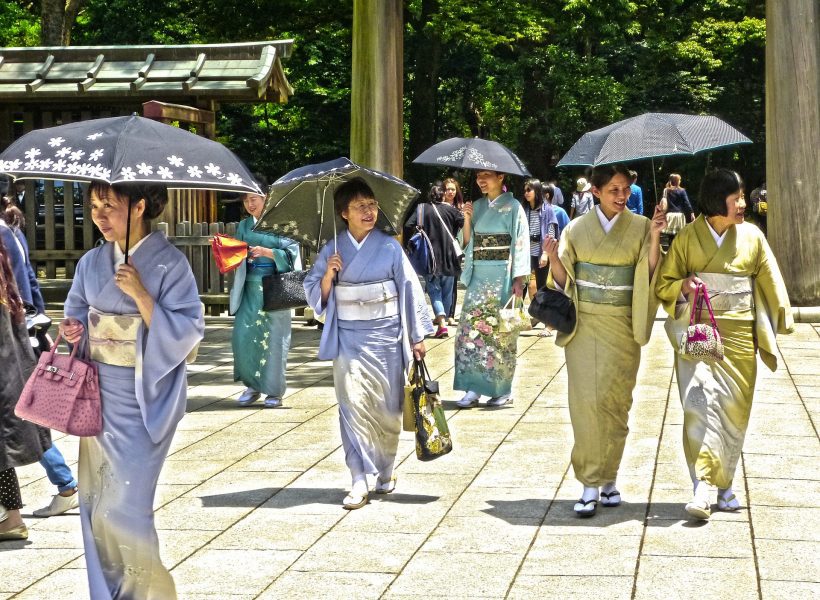Japan: Folk Art and Nature
July 11–23, 2026
Led by Jon Naito, Associate Professor of English, and Mina Kinukawa, Scenic Designer

We invite you to get to know a nation of contrasts through its art and nature.
This itinerary is custom-designed and distinctive to St. Olaf!
See the Overview to the right for more information on what we’ll see, do, and learn.
Japan is a nation of contrasts: a hypermodern society that nonetheless has prioritized a strong connection to ancient traditions, an archipelago that has found innovative solutions to the challenges of its natural environment while receiving all too frequent reminders of the dramatic power of nature, and a nation that often highlights its differences from its neighbors, allies, and rivals while sharing much in common with them.
On this study tour, we will visit this nation of contrasts, giving particular attention to the lessons that can be learned from Japanese folk art and culture and Japan’s natural environment.
In order to learn about these topics, we will explore the Western part of Japan: Kyoto and the Kansai region in which it is situated, the island of Kyushu (home to several important pottery centers, the city of Nagasaki, and some of Japan’s most dramatic natural landscapes), and the remote island of Yakushima (a UNESCO world heritage site that is home to ancient forests with 1,000 year-old trees).
See more details below and use the Register Now button above to join us!
This tour starts in Fukuoka and ends in Kyoto. You can view — and download or print, if you wish — the most current itinerary here.
Our intention with each tour is to provide an itinerary that introduces you to key elements related to your destination or the educational theme, while also providing some free time for you to pursue your own interests or have some down time. The balance can vary from day to day, and from tour to tour.
You’ll get the most out of study travel if you research what to do during your free time. This allows you to reap the benefits of group travel, while also customizing the tour to your interests and activity level. Read more about How to Be an Independent Group Traveler.
 Jon Naito is an Associate Professor of English and currently serving as the Associate Dean of Humanities at St. Olaf. Born and raised in the Detroit area, he received his B.A. from Reed College and his Ph.D. from UCLA. Though his research and teaching focuses on British, Irish, and postcolonial literature, he has a lifelong connection to Japan. Jon lived and worked in Japan for two years between his undergraduate and graduate studies, and continued his study of Japanese language and culture while at UCLA. Like his wife, Mina Kinukawa, Jon has a Japanese father, and he returns to Japan as often as he can to visit his extended family and his Japanese in-laws.
Jon Naito is an Associate Professor of English and currently serving as the Associate Dean of Humanities at St. Olaf. Born and raised in the Detroit area, he received his B.A. from Reed College and his Ph.D. from UCLA. Though his research and teaching focuses on British, Irish, and postcolonial literature, he has a lifelong connection to Japan. Jon lived and worked in Japan for two years between his undergraduate and graduate studies, and continued his study of Japanese language and culture while at UCLA. Like his wife, Mina Kinukawa, Jon has a Japanese father, and he returns to Japan as often as he can to visit his extended family and his Japanese in-laws.
Mina Kinukawa is a scenic designer and an Assistant Professor in the Theater and Dance Department at Macalester College. Mina was born and raised in Tokyo. In Minnesota and beyond, much of her work as a designer has focused on telling Asian and Asian American stories. In recent years, she has worked with theaters such as Theater Mu, East West Players, MN Opera, Theater Latté Da, Ananya Dance Theatre, Penumbra Theatre, New Native Theatre, Full Circle Theater, and Jungle Theater. She received her BFA in Theatre Design and Production from University of Michigan, Ann Arbor, and her MFA in Scenic Design from the University of California, San Diego.
Movement between cities will be by air-conditioned private motor coach. Movement within each city and at cultural/historic sites will be on foot, requiring a lot of walking and standing, often over uneven ground. You should be capable of walking up to five miles per day over possibly uneven terrain, of climbing stairs that may not have handrails, of climbing in and out of various types of transportation, of keeping pace with an active group of travelers on long days of traveling, of dealing with the emotional highs and lows that can occur when experiencing different cultures, and of traveling with a group for several hours each day.
You will be responsible for your own luggage; traveling lightly is highly recommended.
Hotels will be tourist class (four-star or superior rating) with private baths, air conditioning, and English-speaking staff.
The tour price is $7,664 per person, based on double occupancy. A supplement of $889 applies for single occupancy.
Inclusions and exclusions vary by tour, so please read the following information carefully. We try to strike a balance between not nickel-and-diming you once on the tour, while also allowing you some freedom in your price point (for meals, for example). A variety of modes of transportation tends to be pricier than a single bus throughout the tour. Highly rated guides are essential and should command higher wages.
Inclusions: discussions led by Jon Naito, assistance by Mina Kinukawa and a full-time guide, accommodations, breakfast daily and group meals as listed on the itinerary, admissions for group activities, ground transportation during the tour (except initial and final airport transfers), any ferry tickets and internal flights per the itinerary, gratuities to group guides, drivers, and meal servers, and some limited travel insurance.
Exclusions: Airfare to and from Japan is not included. Participants are solely responsible for all expenses not specifically included in the tour fee. Examples of excluded expenses are: international airfare, airport transfers, any passport and visa fees, any recommended immunizations or vaccinations, baggage and trip cancellation insurance, alcoholic beverages (often including at group meals), laundry, dry cleaning, phone charges, room service or other items of a personal nature, expenses incurred during free time or non-group activities, lunch and dinner, unless specifically included on tour itinerary.
This schedule is based on payments St. Olaf College must make to tour vendors to guarantee group rates. We highly recommend that you purchase additional trip cancellation insurance at the time of registration to recover your payments should you need to withdraw from the tour.
Deposit due: $500 upon registration
Refund if you cancel: $450 if you cancel on or before August 31, 2025. If the deposit is made after August 31, 2025 there is no refund.
Interim payment due: $3,000 on September 1, 2025
Refund if you cancel: $1,500 if you cancel on or before April 30, 2026
Balance due: May 1, 2026
Refund if you cancel: None, unless the tour is full and your place can be resold
Cancellations must be in writing.
EXTREMELY IMPORTANT: look carefully at this food allergy information. Some food allergies are very difficult to manage in Japan due to the common use of a variety of foods in sauces and bases.
Carefully read each tab in the Participant Documents.
Review the Terms and Conditions and Release and Waiver.
Review the latest information on recommended immunizations, visit the Centers for Disease Control (CDC).
Check your passport: ensure that it has at least 6 months’ validity past the program return date. Should you need to renew, visit the U.S. Department of State for instructions.
Take time to Prepare for your adventure by checking out a variety of resources, including frequently asked questions, general health information, included travel insurance, safety overview, and more.
Book your flights. Read the Go Letter linked above and see our tips on Booking Your Flights.

This tour is a GO and has 5 spaces available. Registration closes on May 11, 2026.
Ready to go?
You must be logged in to post a comment.